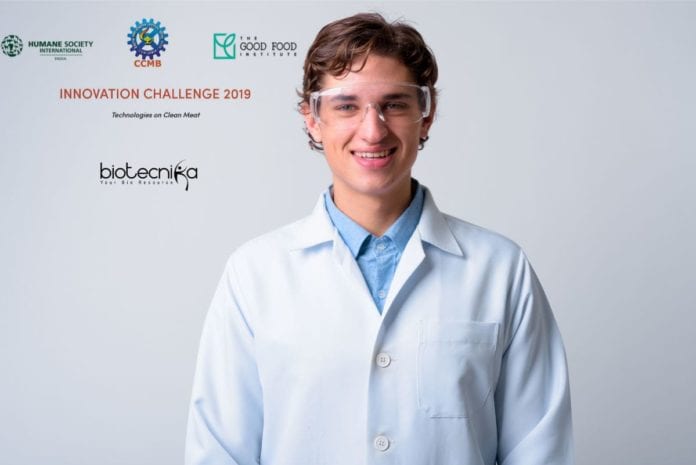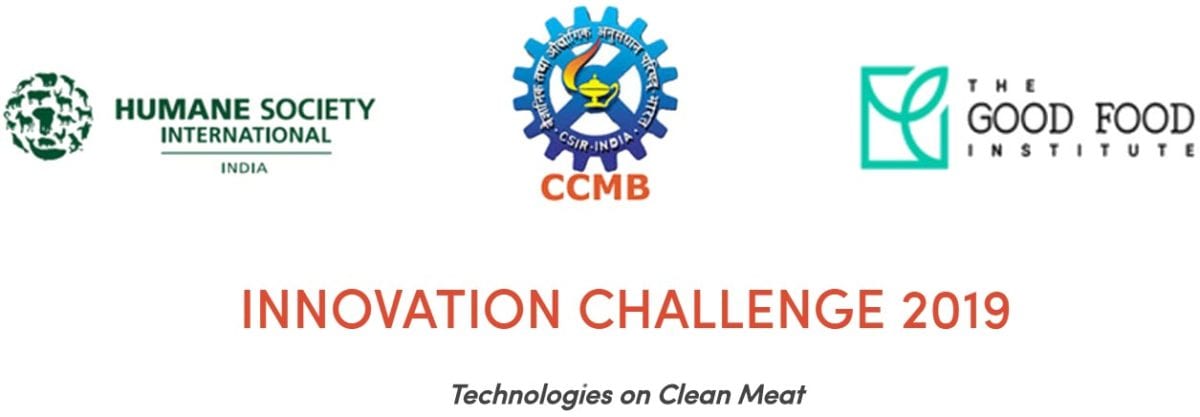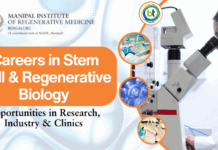ATAL Incubation Rs 5 Lakh Research Grant – Innovation Challenge 2019
A unique opportunity for Indian nationals to participate in the Innovation Challenge 2019 for Technologies on Clean Meat. Supported by ATAL Innovation Mission, NITI Aayog. Humane Society International India, Centre for Cellular & Molecular Biology, The Good Food Institute. Check out all details on the same below:
This call expires in :
Table of Contents
FUNDING OPPORTUNITY FOR INNOVATION CHALLENGE
Clean meat (also called cultured meat or cell-based meat) is animal meat grown by farming cells obtained from the animal directly rather than by raising and slaughtering animals. Clean meat is produced by taking a small sample of animal cells, and replicating them outside of the animal. The resulting product is biologically and nutritionally equivalent to conventionally produced meat, but without the antibiotics, E. coli, salmonella, or animal waste. At its essence, meat is simply a collection of cells—predominantly muscle cells, with fat cells and a handful of other cell types, collectively called the connective tissue, contributing to its structure. All of these cells can be grown in controlled, sterile environments outside of the body of an animal
, resulting in a product that replicates the sensory and nutritional profile of meat.The reasons for investing in the research and development of clean meat are myriad. Conventional animal agriculture poses substantial threats to human health, the environment, and animal welfare. It creates significant public health threats from antibiotic resistance and zoonotic disease epidemics, as well as acute consumer risk in the form of foodborne illness from fecal contamination introduced during slaughter. It is also a leading cause of environmental destruction – including deforestation, ocean dead zones, and water and air pollution – and contributes more greenhouse gas emissions than the entire global transportation sector. . Finally, consumers are increasingly concerned about the treatment of farmed animals. Producing meat via large-scale cell culture can significantly alleviate all of these burdens. Public health and animal welfare concerns may be virtually eliminated, as animal rearing, slaughter, and antibiotic use are absent from the process. The resource burden is also likely to be significantly reduced relative to industrial animal meat production. Removing animals from the process also eliminates fecal waste, a leading cause of environmental pollution of both air and water, and associated methane production, a significant contributor to the climate impact of animal agriculture.
Clean meat production will require up to three principal material inputs:
- the original cell line,
- the cell culture medium, and in some cases
- a scaffold.
A cell line must be both stable and immortalized: it must behave consistently and predictably, while also maintaining the capacity to divide, through many generations. The starter cells are added to a bioreactor along with cell culture media, which supplies nutrients to the cells to enable them to reproduce and create the biomass that will eventually be consumed. Scaffolds, which provide a support structure for the cells in order to help create a desirable meat like texture, will be used by some companies for certain types of products, but are not as a rule required in clean meat production.
In 2018, India took its first significant stride towards playing a leading role in the development of clean meat. Humane Society International/India and CSIR – Centre for Cellular and Molecular Biology, Hyderabad signed a MoU for its advancement . The two organizations joined with the Good Food Institute to co-host the Future of Protein Summit in August 2018, bringing together scientific, political, and entrepreneurial leaders in the sector from India and around the world. In February 2019, the Good Food Institute and Institute of Chemical Technology, Mumbai signed an agreement to set up a cell-based meat research facility in Maharashtra, aimed at creating a hub of innovation and industry in the sector. Within a year of the MoU and the Future of Protein Summit, the Centre for Cellular and Molecular Biology was awarded a substantial grant from the Government of India Department of Biotechnology towards the development of cell-based meat in March 2019, with National Research Centre on Meat, Hyderabad playing a supporting role. This funding award is one of the largest made in this sector anywhere in the world, and further cements India’s leading position in investing in the future of food.
To support further development of technologies for the development and commercialization of cell – based or clean meat in India, Humane Society International/India, Good Food Institute India and AIC – CCMB are offering funding to support the open-access publication of in-depth review and conceptualization of accessory technologies related to development and scaling up of cell – based meat or clean meat in India. This Innovation Challenge will accept applications for papers reviewing various topics related to the state and scope of clean meat in India.
Remit
Each review should:
- Examine the state of the science in the specific area of cell – based meat or clean meat and identifying key challenges;
- Critically evaluate the methods, technologies used for this area till date;
- Offer concrete recommendations/solutions for optimizing the use of technologies and tools to offer solutions to loopholes currently preventing commercialization of cell – based or clean meat
- Be applicable and ultimately accepted for open-access publication in a high-visibility, peer-reviewed journal.
Suggested topics for the Challenge may include, but are not limited to:
- Examining the Indian ecosystem and body of work in any of the critical technology elements of cell-based meat – cell line isolation and optimization, food-grade or biodegradable scaffolds for 3-D culture, optimized non-animal cell culture media, and bioreactor design.
- Energy use and efficient use of waste streams for scaling up bioprocess
- Opportunities for Indian biopharmaceutical companies to invest in clean meat based on their current infrastructure and product portfolio
Any submissions for topics other than these will also be considered equally and on their own merits.
Eligibility:
- Representatives of public and private institutions with minimum educational qualification of Ph.D
- PhD & post-doctoral level students may serve as lead investigator of the project proposal with a brief letter of support signed by the faculty member expressing his/her commitment to serve as advisor & project collaborator.
Additional Information:
All findings, protocols and materials generated through this grant will be published under the Creative Commons Attribution 4.0 Generic License (CC BY 4.0, https://creativecommons.org/licenses/by/4.0/) or an equivalent license. For ease of access, all materials and protocols will be deposited into existing databases or collections. A portion of the grant money should be utilized towards Article Processing Charges for Open Access publication, as applicable.
Important Dates and Payment Structure:
Launch of Innovation Challenge: September 15th, 2019
Last date of application: December 15th, 2019
Screening of Applications: December 15th , 2019 – January 15, 2020
Date of Submission of first draft: 3 months after selection of applicants
Total grant amount per project: ₹ 5,00,000
Date of first tranche of 25% will be after acceptance of first drafting by the reviewing committee
Final payment will be done upon acceptance of the paper upon publication
About Atal Incubation Centre – Centre for Cellular & Molecular Biology
The Atal Incubation Centre- Centre for Cellular & Molecular Biology (AIC-CCMB) is a premier technology incubator supporting deep science startups. Established at CSIR-CCMB, Hyderabad under the Atal Innovation Mission of NITI Aayog, GoI in 2017, this incubation centre has become a hub for life-sciences and biotechnology startups and MSME’s from all over Telangana and the country in a very short time. At AIC-CCMB, we are dedicated to nurturing a thriving ecosystem for start-ups and innovators with early stage technologies by leveraging the scientific competencies of CSIR-CCMB and its sister labs. We do this by actively engaging with mentors, alumni, fund providers, experts, consultants and industry to build an empowering ecosystem through our various programs and activities.
About Humane Society International/India
Humane Society International/India is the Indian affiliate of Humane Society International, one of the largest animal protection organisations in the world. A non-profit organisation working for the protection of animals through education, advocacy and hands-on training, HSI/India is one of the only animal protection organizations in the country working to help all animals—including animals in laboratories, animals on farms, companion animals and wildlife. HSI/India actively engages with food businesses to increase the availability of plant-based foods on menus and supports open scientific research and policy development on the alternative protein sector.
About Good Food Institute
Since its inception in 2016, the Good Food Institute (GFI) has established itself as an expert organization in the burgeoning field of clean meat. We have published rigorous white papers and academic journal articles, and created detailed guides for understanding and entering the clean meat field. (Notable publications and media highlights are listed in the Appendix.)
GFI also offers its services to stakeholders at every phase of the market, which allows us to maintain neutrality and cultivate an interdisciplinary, broadly informed perspective on the clean meat industry. We provide support and information to entrepreneurs, existing corporate entities, scientists, regulators, and other mission-aligned nonprofit organizations.
APPENDIX: SELECTED PUBLICATIONS AND MEDIA HIGHLIGHTS
Liz Specht, Is the Future of Meat Animal Free? 01.18 Food Technology 17-21 (Jan. 2018), available at https://www.gfi.org/images/uploads/2018/08/LizSpechtIFTFuture.pdf.
- In this cover story for Food Technologies’s January 2018 issue, GFI’s Senior Scientist Dr. Liz Specht explains and discusses the future of clean meat.
Valentin Waschulin and Liz Specht, Cellular Agriculture: An extension of common production methods for food. The Good Food Institute (Mar. 6, 2018), available at https://www.gfi.org/images/uploads/2018/03/Cellular-Agriculture-for-Animal-Protein.pdf.
- An overview of this production method, including its history and its potential for changing today’s food supply.
Specht, E.A., Welch, D.R., Rees Clayton, E.M. and Lagally, C.D. Opportunities for applying biomedical production and manufacturing methods to the development of the clean meat industry. 132 Biochemical Engineering Journal 161–168 (Apr. 15, 2018), available at https://bit.ly/2NkHC6s.
- A discussion of new applications of current biomedical products and manufacturing methods for clean meat, as well as opportunities for synergistic product development through partnerships between academic researchers, established industry players in cell-based therapeutics, and the emerging clean meat industry.
Elizabeth Specht et al., An Ocean of Opportunity: Plant-based and clean seafood for sustainable oceans without sacrifice, The Good Food Institute (2018), available at https://www.gfi.org/seafood.
- An examination of the potential of plant-based and clean seafood to transform the existing seafood industry.
Liz Specht, Meat by the Molecule: Making meat with plants and cells. The Biochemist (Aug. 2018), available at http://www.biochemist.org/bio/04004/0018/040040018.pdf.
- A discussion of opportunities in plant-based and clean meat.
Click here to Download Application Form
Last Date of Application extented till: 11:59pm, December 15th, 2019
APPLY ONLINE
Editor’s Note: ATAL Incubation Rs. 5 Lakh 2019, ATAL Incubation Technologies Rs 5 Lakh 2019, ATAL Incubation Rs 5 Lakh Notification 2019, ATAL Incubation Rs 5 Lakh Research Grant – Innovation Challenge 2019, ATAL Incubation Rs 5 Lakh Research Grant, INNOVATION CHALLENGE 2019, check out the Podcast, Biotecnika Times Newsletter and all of our social media for the latest in the life sciences industry.









































